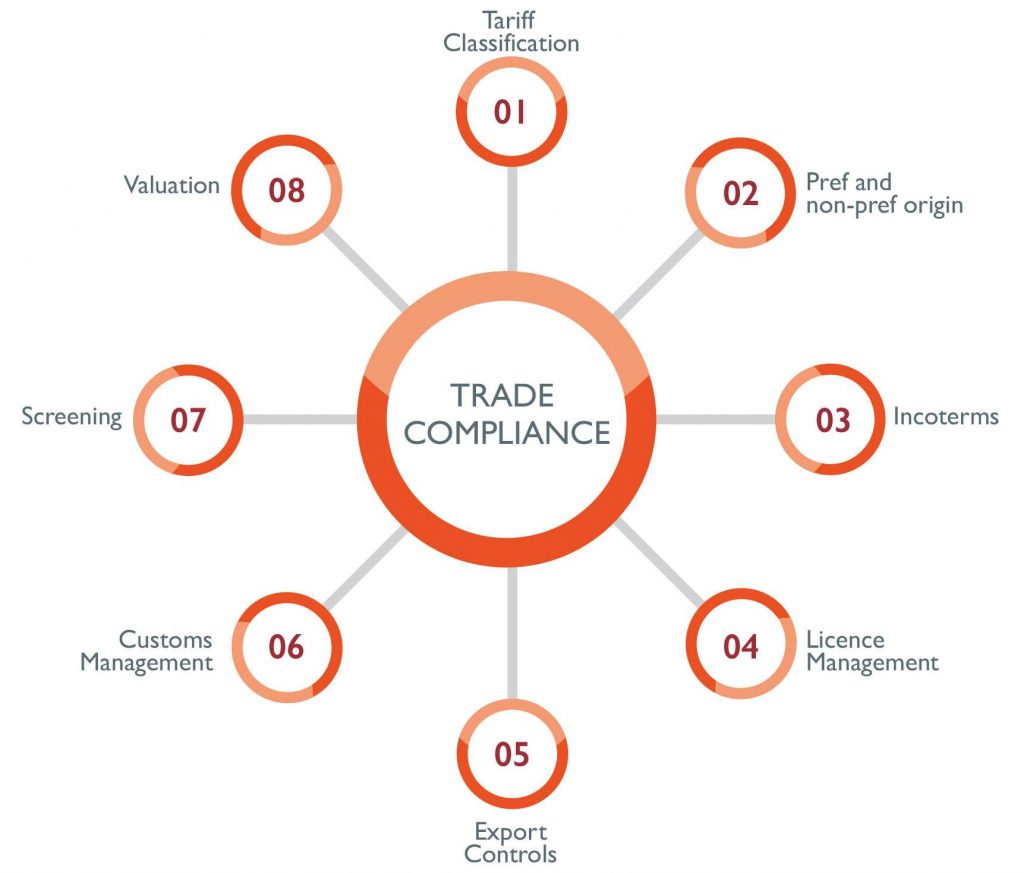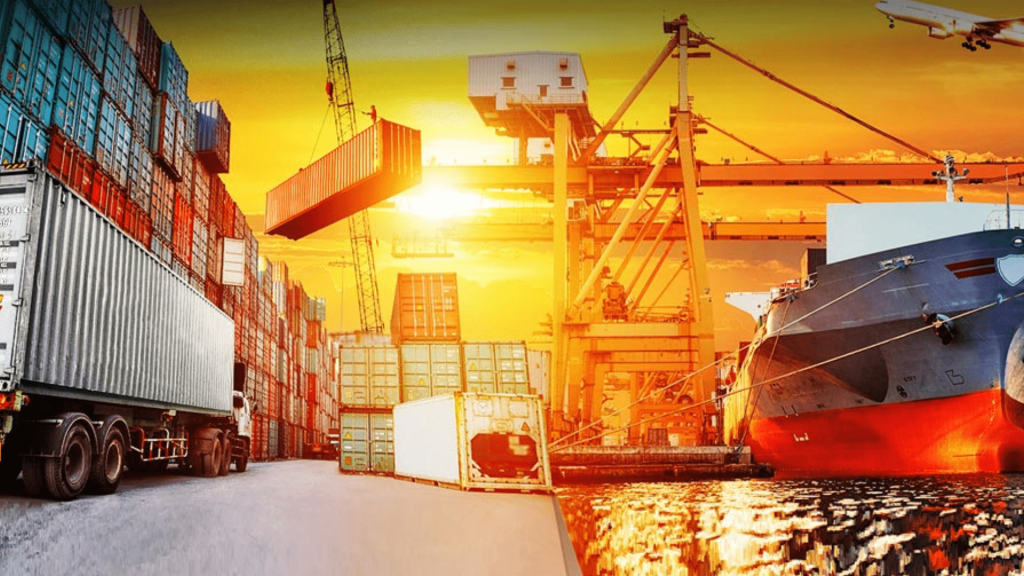무역 규정 준수란 무엇이며 중요한 이유는 무엇입니까?
오늘날의 글로벌 시장에서 기업은 일본 안팎에서 비즈니스를 수행합니다. 공급망은 다양한 무역 협정, 국제 무역 규정 및 관세 분류에 따라 달라집니다.
그러나 이러한 특산품에도 불구하고 많은 기업들이 의도치 않게 수입 및 수출 위반을 받고 있으며, 이러한 위반으로 인해 무역 규정 준수 기능이 실패할 경우 막대한 벌금과 벌금이 부과됩니다.
국제 비즈니스는 그 어느 때보다 복잡하며, 수출 통제, 세관 당국 및 수출 법규에 대한 명확한 이해가 필요한 이유입니다. 그 결과 수출 및 수입은 일상적인 작업의 필수적인 부분이 되었습니다. 귀사의 비즈니스는 글로벌 무역에 의존하기 때문에 귀사의 운영이 견고한 글로벌 무역 규정 준수를 보장해야 합니다.
경쟁력을 유지하려면 기업은 수입 및 수출에 적용되는 법률과 규정을 포괄적으로 이해해야 합니다. 간단히 말해, 이것이 바로 무역 규정 준수입니다!
무역 규정 준수란 무엇인가요?
무역 규정 준수는 국제 수출, 무역 및 금융 법을 준수하는 것을 의미합니다.
누가 규정을 준수해야 하나요?
모든 산업 분야의 기업은 규정 준수 요구 사항을 준수해야 합니다. 통신, IT, 연구, 항공 우주 또는 금융 기관과 같은 보안에 민감한 산업에 대한 규정만이 아닙니다. 규정 미준수에 대한 처벌은 심각할 수 있습니다.
무역 규정 준수가 중요한 이유는 무엇인가요?
무역 규정 준수는 수출입에 필수적이며 모든 비즈니스의 책임입니다. 비즈니스 규모가 클수록 규정 준수에 대한 기대치도 커집니다. 규정을 준수하려면 비즈니스에 어떤 규칙과 규정이 적용되는지 이해해야 합니다. 규정을 준수한다는 것은 고객과 공급업체의 요구를 충족하는 동시에 지속 가능성, 장기적인 성장, 경쟁 우위를 지원한다는 것을 의미합니다. 이는 성공적인 글로벌 공급망의 핵심 요소입니다.
무역 준수의 이점:
- 합법적이고 책임감 있는 거래를 촉진하여 기업의 평판과 직원을 보호합니다.
- 벌금 및 과태료에 대한 노출이 최소화됩니다.
- 배송 지연을 방지하여 고객 만족도를 높입니다.
- 지연, 조사 및 벌금을 피하여 비용을 절감할 수 있습니다.
규정 미준수의 결과:
1- 배송 지연
2- 재정적 처벌
3- 형사 제재

거래 규정 준수의 핵심 요소:
- 관세 분류 - 상품 및 관세 코드를 사용하여 상품을 올바르게 분류하는 것은 세관 규정 준수뿐만 아니라 정확한 관세율, 상품의 원산지, 인트라스탯, 수출 통제 및 기타 여러 세관 절차를 수립하는 데 기본이 됩니다.
- 특혜 원산지는 두 국가 또는 국가 블록 간의 특정 무역 협정과 관련이 있습니다. 수출하는 상품에 특혜 원산지가 있는 경우, 해당 상품이 고객 국가에 입국할 때 관세율이 인하되거나 면제될 가능성이 높습니다.
- 비특혜 원산지는 배송되는 제품의 원산지를 지정하는 곳입니다. 원산지 식별과 관련된 규칙은 수입 국가의 규칙에 따라 다릅니다.
- 인코텀즈 - 인코텀즈는 배송 수명 주기 동안 구매자와 판매자의 책임을 명확하게 정의하는 데 사용되는 전 세계적으로 인정받는 거래 조건으로, 양 당사자가 배송, 비용, 위험 및 책임에 대해 명확히 알 수 있도록 계약에 필수적인 요소입니다.
- 라이선스 및 허가 - 특정 제품을 수입 또는 수출할 때 허가 또는 면허가 필요한지 확인하는 것은 회원님의 책임입니다. 예를 들어 군사/준군사적 물품, 기술, 의약품, 화학물질, 예술품, 식물, 동물 등에 대한 통제가 있습니다.

올바른 라이센스 없이 수입 및 수출하는 경우 상품이 압수되고 지연됩니다.
- 수출 통제 - 특정 제품은 유해한 용도로 사용될 수 있으므로 수출 통제 법규의 적용을 받습니다. 모든 제품을 해당 법규에 따라 분류하는 것은 사용자의 책임입니다.
- 세관 관리 - 비즈니스가 세관 조사 대상인 경우 명확한 조치 계획을 세우세요.
- 선별 - 고객, 공급업체 및 거래 데이터를 제재 대상, 정치적으로 노출된 사람 및 기타 위험한 단체에 대해 선별하면 실수로 바람직하지 않은 사람과 거래하는 일이 없도록 방지할 수 있습니다.
- 가치 평가 - 모든 발송물에는 적절한 가치 평가가 있어야 하며, 이의를 제기할 경우 이를 방어할 수 있어야 합니다. 평가는 세계무역기구(WTO) 에서 승인한 6가지 평가 방법론 중 하나를 준수해야 하며, 단일 행정 문서(SAD 또는 양식 C88)에 신고해야 합니다.
일본 시장 진출
일본 시장 진출에 성공하려면 현지의 도움을 받는 것이 필수적입니다.
어디서부터 시작해야 할지 모르시겠어요? 저희가 도와드리겠습니다!
COVUE는 다양한 제품 카테고리에 대한 수입 라이선스를 보유한 신뢰할 수 있는 일본 회사입니다. 당사의 규제 전문가가 시장 진입 프로세스를 가속화하여 비즈니스에 집중할 수 있도록 도와드립니다.


